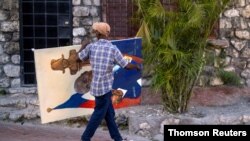Haitian President Jovenel Moise will be buried on July 23 in the northern city of Cape Haitian, a member of the official funeral organization committee said Friday.
"We have a logistical team who will evaluate the site where the funeral will be held," Minister of Culture and Communication Pradel Anriquez, a member of the committee, told reporters during a news conference in Port-au-Prince. A schedule of events will be published soon, he said.
Funeral planning committee members include interim Prime Minister Claude Joseph; the ministers of defense, culture and communication, and interior; the director of the Cabinet (chief of staff); the secretary-general of the presidency; and the director-general of the MUPANAH (Musée du Panthéon National Haitien).
Anriquez said there are three events planned. On July 20, an official ceremony honoring the life of Moise will be held at the MUPANAH. He said the national palace protocol team is organizing that event.
On July 22, the president's wake will be held, Anriquez said. But he did not provide further details, adding only that "the public funeral of the president of the republic will be held in accordance with the wishes of the Moise family and also in accordance with the law."
First lady Martine Moise is being treated in Miami, Florida, for injuries suffered during the attack that killed her husband.
Joseph said Friday that Martine Moise plans to return to Haiti for the funeral. He said that the first lady is in good condition and has been in constant contact with him since she arrived in Miami.
Joseph also confirmed that a video message posted earlier this week on Martine Moise's official Twitter account is authentic, along with subsequent tweets she posted this week of herself lying in a hospital bed.
The interim prime minister said the slain president had expressed a desire to be buried next to his father in Haiti's north. The details were included in an official government decree issued on March 11, 2020, pertaining to the burial of heads of state, Anriquez told reporters.
"The Haitian government in its entirety is committed to giving the president a proper funeral," he said.
Ex-president Aristide back in Haiti
Elsewhere in the capital, a group of supporters of former President Jean Bertrand Aristide took to the streets to welcome him back to Haiti after undergoing treatment for an undisclosed illness in Cuba.
Aristide fans waved Haitian flags, white flags, freshly picked tree branches, homemade signs and played traditional festive "rara" music as they waited to see him.
"Welcome back, king. We have always said that Haiti is now paying for what happened in 1990, and as long as the constitutional order is not reestablished, the wound will remain. It is time to repair the divisions that exist," a man who did not give his name told VOA Creole. "We are standing out here in front of the airport to extend our greetings."
"The president who truly loved us and was the most capable leader to lead us was removed by the colonists in a coup d'etat. Hopefully, the Haitian people now see clearly what is going on," another Aristide supporter, who stood on the side of the airport road to welcome the former president back to Haiti, told VOA.
Aristide was Haiti's first democratically elected president after dictator Jean-Claude Duvalier was removed from power in 1986.
He governed Haiti from Feb. 7-Sept. 30, 1991, when he was deposed in a military coup. After living in exile in the United States for three years, he returned to lead Haiti in October 1994 until 1996.
A year later, he created the Fanmi Lavalas (Lavalas Family) political party. He ran for president as its candidate and won in 2000. (Haiti's constitution bars heads of state from holding consecutive terms.)
In July 2001, Aristide was ousted in another military coup and lived in exile in South Africa until spring 2011, when he was allowed by then-President Michel Martelly to return to Port-au-Prince. He has mostly stayed out of the limelight, but his party remains active in politics.
Matiado Vilme in Port-au-Prince, Haiti, contributed to this story.




